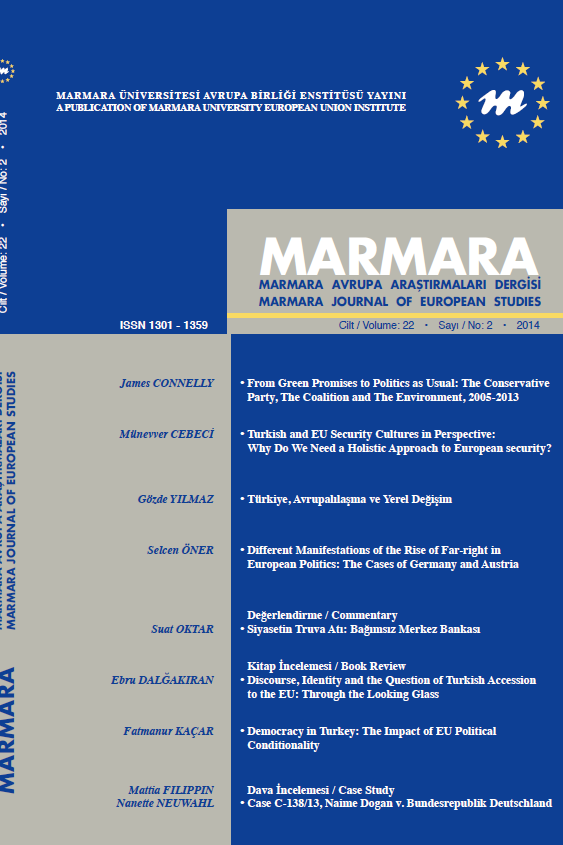AVRUPA BİRLİĞİ'NE UYUM SÜRECİNDE TÜRKİYE CUMHURİYETİ'NDE EĞİTİM
Avropa Topluluifu ile TUrkiye orasmda, tam iJ.velik hedefine dogro ilerlenen 40 ylllfk seriJvenin Ozellikle son bq ytll it;inde egitim de diger esas tartl$ma zeminint olu$turan konular arasmda yerini almaya ba$ladt, Topluluk lle TUrkiye arasmda Giimriik Birligi Koran (1996), Helsinki Zirvesi'nde aday ilyelik statUsiJ. ( 1999) ile birlikte gclen 1993 Kopenhag Kriterleri 'ne uygunluk wrunluf:u, Kallbm Ortakhg, Belges! (2000), Tiirkiye'nin kcndf Ulusal Program1 (1001), re AB Komisyonu tarafindan son iit; ythn her Ekim aytnda haztrlanan I!erleme Raporhm .. viinctimde ve siyasette, bilim vc teknolojide, hizmff ve sanayi sektlirlerinde yer alncak ve Avropa standanlannda fab::;abilecek insan gucunun kalitesinin (vilqtirilmesi ve Avrupa iilkeleri arasmda u:rumlu bir geli;menin saglanmas~ aqtsmdan eiitim alanma da olduh;a belirgin. bir vurgu yoptlmG'mrda nki!i flfd!l t::f!;i!-'f" hakknw• l•i,';ii" ''(l!c>ndo~·!(/i'C 3!!1({ cinsiw~t, di! vc inam:; aynm: o{madan swmbnas; ilkr:si; hircvlerin S(lsy:d, kidtiircl, t·e ;:ihinsel yOn!erden geli.ymesi ;.,~fu bumm temcl bir hak olarak algtlanmrrst geregl, T/irkiye 'de dev/etin eifitimfe baf1lnntdr kam!i gOrevlerim btmdmt hOyfe r;afjm ve 4vrupa Bir!ijji iiye!iijtni11 gert.>klerine glJre tasar!ama\1'1! ve uygu!amasnu gerekli k!lmakta. Egimn sistcml.::rinin, gdi$en ekonomrk siire(' doijruft!mmda mtdik!i .::lenum reti:jfirilme.c,;im {ht(vm; duymasJ. uku!da !:'dinilt:'l mesleki hi.lf:;lierin !.; ya;mm!ula y.;rersi: k(J/mam(l.yl ~~·in yeui iJniuu!erin a/tl!nuw, .direJJi eiitil!lin ~Jnem k:::annli/.\'1. efiirim roneriminde ise dcvh:tin e{!,itim hizmetlPrini gidcn:k Pa:::ar .:konomishtt' d!!vtetmek ::orwld# kalma.; 1 Tiirk(ve 'nin df' egfrim ,·ej(n·m!an konular:uda .Avrupa Bir!ijji ve Diit!) ;J Bailkusr jim/umw kup1 m/!fWSllll, Bun 'dun Ungdriilen mode/len>, programfam Vt' uygulamalarn yiindmesini gi!firdi. Al-rttpa T oplulufju 'nda 19 70 'li ydlarJa ge!istirilme}N' h,J~'ianan J·e "Egltimdc Avrupa BO_FIJ/!1 ·· alarak a.d!andmlan girl;im. e[;itimi ya!n:::ca Avrupa 'nm ekonomik gdi;imi trin degd, Maanrichr An!a.;·masJ"I/dat! (1993) hu :r·ana AB 'nin geni->leme l'C deriniqme <:iireci i<;in de biitiin hasamaklanyla 31)·asaf iinemi biiyiili Nr Top!uluk pmjesi o{amk a{g!lamakta ve yeniden yaptlandmnaktadtr.
Anahtar Kelimeler:
AVRUPA, BİRLİĞİ'NE, UYUM
AVRUPA BİRLİĞİ'NE UYUM SÜRECİNDE TÜRKİYE CUMHURİYETİ'NDE EĞİTİM
Throughout the 40-year long relations between the European Community and Turkey on the road to Turkey's membership, it is only within the last five years that the subject of education has emerged to take its place among the other difficult and lJasic problems of the partnership association and the 1996 Customs Union, The educational system in Turkey has remained well behind the common ends of the European Union, with respect w strucrural adjustment to democratic demands, economic development, and advancement in science and technologies. Moreover, the centralist adminisrration and the general state authariry exercised over the educational system does not leave much room for sufficient autonomy to be exercised in any of the educational instiwtions. The European Union had refrained from tackling the subject of education in Turkey; that is, before the 1999 Helsinki Summit of the European Council where Turkey was granted candidate status and faced the 1993 COpenhagen Criteria for membership,· was confronted with the 2000. Accession Partnership Document, to which she had 10 respond wifh her own National Repon; and with the Progress Reports for Turkey, produced in every October of the last three years. The European Union has, nevertheless. taken a step in the right direction by opening the way for Turkey's entry into the European educational area through the Socrates. Leonardo da Vinci and Youth Programmes. The European Community and her member states launched the European Dimension in Education for the first time in the 1970s, and decided to intensify these efforts in the 1980s. The "Green Peper on the European Dimension in Education" was published by the EC in 1993, and the European Union has been exercising a growing influence in general education and especially over vocational and technical schools since the Maastricht Treaty (1993 ). The multiculturaiity of students in the Union has necessitated the application of intercultural, multicultural and anti-racist educational approaches. Similar provisions can be found in the 2000 Accession Partnership Document for Turkey, where there is a requirement of respect in education for Turkish citizens who are of a culture that may be different from the culture of the majority of the citizens. In the annual regular Progress Reports, there are references to the unsatisfactory rate of schooling, the need for restructuring of the system and revision of the methods. It is asserted that authority and responsibility need to be delegated from the central administration to the regional directorates.
___
- -
- ISSN: 1301-1359
- Yayın Aralığı: Yılda 2 Sayı
- Yayıncı: Marmara Üniversitesi
Sayıdaki Diğer Makaleler
AVRUPA BİRLİĞİ'NE UYUM SÜRECİNDE TÜRKİYE CUMHURİYETİ'NDE EĞİTİM
AVRUPA BİRLİĞİNE ÜYELİK SÜRECİNDE POLONYA EKONOMİSİ
IMPROVING TURKISH - GREEK RELATIONS A Neo-Functionalist Approach
REGULATING CONVERGENCE: Approaches of the EU and the UK, and New Issues in Media Regulation
DÜNYA DENEYİMİ YÖNÜNDEN KKTC OMBUDSMAN DAİRESİNİN DEĞERLENDİRİLMESİ
eEUROPE: GOALS, ACHIEVEMENTS, CHALLENGES AND PROSPECTS
A COMPARATIVE STUDY OF TRADEMARKS UNDER GERMAN AND TURKISH LAW
THE NEW GLOBAL ECONOMIC ENVIRONMENT
EU, US, and TURKEY in THE CAUCASUS: IS THERE A CLASH OF INTERESTS?
